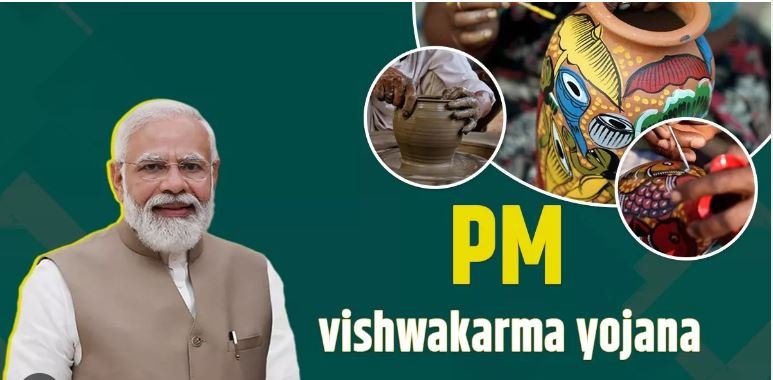On 17th September 2023, PM Narendra Modi Introduces The Vishwakarma Scheme For Traditional Craftspeople And Craftsmen and Exhorts People To Be “Vocal For Local.”
Vishwakarma Scheme : Prime Minister Narendra Modi introduced the PM Vishwakarma Scheme on Sunday to offer collateral-free loans and skill development to 18 categories of traditional artisans and craftspeople, claiming that it was urgently necessary to recognize and promote “Vishwakarmas”. The PM Vishwakarma Scheme would provide guarantee-free loans of up to Rs 3 lakh, a voucher to purchase toolkits, and access to a five-day skill-building course for artisans.
Overview of Vishwakarma Scheme
The program will cost Rs 13,000 crore over five years, through 2027–2028. Speaking at the opening of Yashobhoomi, the India International Convention Center in Delhi’s Dwarka, Prime Minister Modi also noted that India is rapidly rising to prominence as a conference tourism hotspot and that the new facility, along with the “Bharat Mandapam,” will serve as a platform for showcasing the India of the future.
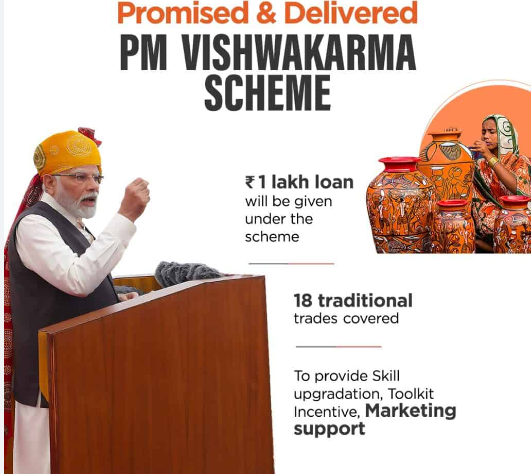
Vishwakarma Scheme : In a bid to empower traditional craftspeople and artisans and promote the “Vocal for Local” initiative, Prime Minister Narendra Modi has introduced the Vishwakarma Scheme. This visionary program aims to provide crucial support and recognition to the unsung heroes of India’s rich cultural heritage—the skilled craftsmen and craftswomen who have been preserving and perpetuating traditional crafts for generations. The Vishwakarma Scheme is set to not only uplift the livelihoods of artisans but also celebrate the diversity and craftsmanship that make India truly unique.
PM Narendra Modi noted the rising demand for handcrafted goods and claimed major international corporations outsource their work to local businesses. “We are aiming to get our Vishwakarma friends receive this outsourced job so they may join the global supply chain. That is why this plan is an attempt to bring the Vishwakarma friends up to date, he remarked at the inauguration ceremony, which fell on both his birthday and Vishwakarma Jayanti.
According to Modi, India currently only accounts for 1% of conference tourism worldwide. He added that international exhibition centers like Yashobhoomi and Bharat Mandapam will help to improve this percentage. “I want to assure the artisans who are virtually joining from rural places that this center will present your work to the entire world. It will be crucial in expanding the market for Indian goods, according to Modi.
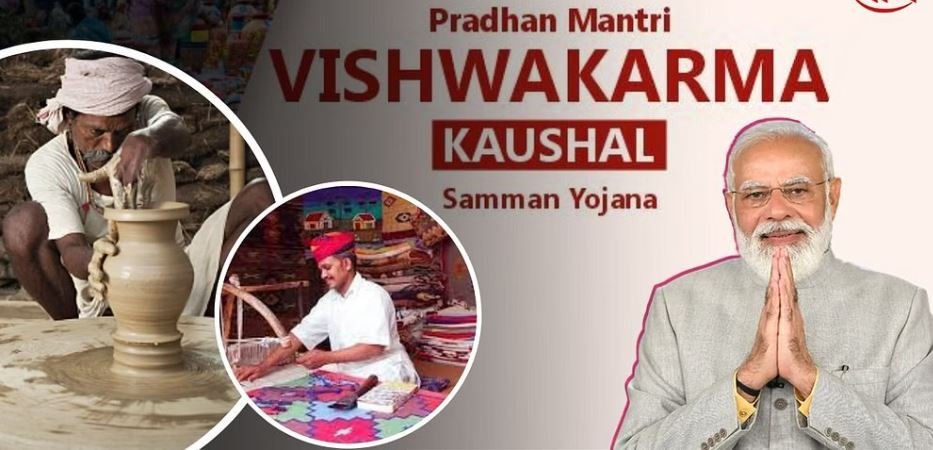
Additionally, he emphasized the “One District, One Product” program and underlined how the PM Svanidhi Scheme opens up banking channels for street vendors. The prime minister declared, “Modi stands for those who have no one to care about them.” In his words, he was here to help, to provide them a life of dignity, and to make sure that services were provided on time every time. According to an official statement that quoted him, “This is Modi’s guarantee.”
He added that the commitment to “vocal for local” is the duty of the entire nation. Before we can take the local global, we must first speak out for the local, he continued. The prime minister stated that the “development of the deprived” is a top priority for the central government.
The PM Vishwakarma Scheme would provide guarantee-free loans of up to Rs 3 lakh, a voucher to purchase toolkits, and access to a five-day skill-building course for artisans. Finance Minister Nirmala Sitharaman, Commerce and Industry Minister Piyush Goyal, MSME Minister Narayan Rane, and Skill Development Minister Dharmendra Pradhan attended the launch alongside Prime Minister Modi.
18 categories of artists and craftspeople, including carpenters, boat builders, blacksmiths, potters, stone sculptors, weavers, and garland makers, are targeted under the PM Vishwakarma scheme, which is run by the MSME Ministry. The program would provide beneficiaries with a 5-day training course for the skills development component, along with a daily stipend of Rs 500. Additionally, it would provide them a coupon for Rs. 15,000 so they can purchase the toolkits they need for their trade. In his speech, PM Modi made the request to the artisans, “I request the artisans to buy only Made in India toolkits and from GST registered stores.”
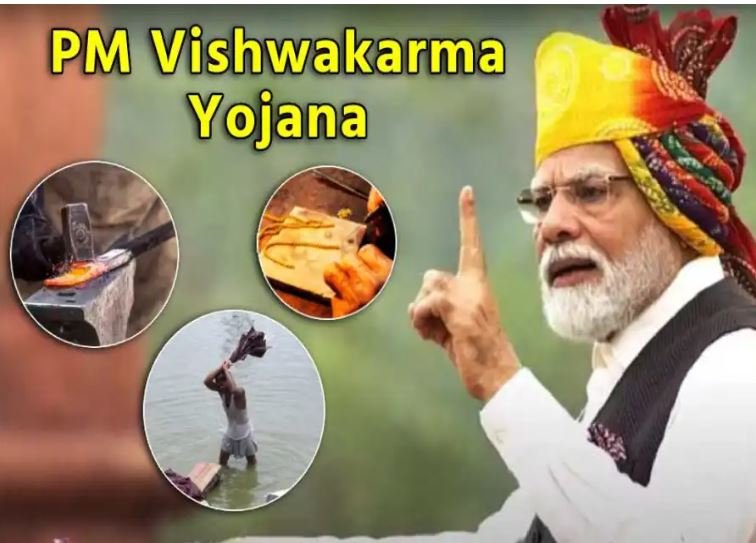
Beneficiaries would first be eligible for an interest-free loan of Rs 1 lakh under the financial aid part of the program, which they would have to repay within 18 months. Upon repayment, they will be eligible for a second loan tranche worth Rs 2 lakh with a 5% interest rate. Beneficiaries would also receive a subsidy of up to 8% of the interest amount, said Finance Minister Sitharaman. She continued by saying that the verification of beneficiaries would take place at three levels, namely the state, district collector, and gram panchayat levels. The final beneficiary list will be created by committees, according to her, who will also identify these individuals.
Additionally, the PM Vishwakarma scheme’s financial assistance component is guarantee-free. The prime minister claimed that the reason why banks do not request your guarantee is because Modi provides it.
According to the plan, the beneficiary will pay a low interest rate of 5%, with the Ministry of Micro, Small, and Medium Enterprises covering the remaining 8% of the interest. The Center will pay the credit guarantee fees. About 30 lakh households of traditional artisans and craftspeople, including weavers, goldsmiths, blacksmiths, laundry workers, and barbers, are expected to profit from the program.
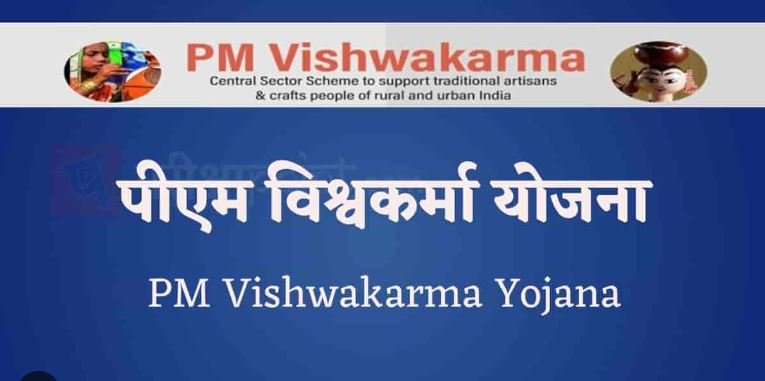
The prime minister also emphasized the value of artisans in contemporary society, noting that their trade remains essential despite advancements in technology. “These artists will always be required, regardless of how much technology develops. People prefer drinking from (earthen) pots these days, even with refrigerators, he remarked.
In light of impending national holidays like Ganesh Chaturthi, Dhanteras, Deepawali, and others, the prime minister asked people to support local businesses by purchasing goods made by the Vishwakarma family in particular.
Along with the program, PM Modi also unveiled a toolkit guide for artisans that was printed in several different languages and postal stamps that were based on the program. A blacksmith from Punjab, a boat builder from Kerala, a basket maker from Tripura, and a tailor from Jammu & Kashmir were among the artists to get the PM Vishwakarma certificate from him.
He also looked at the 3D model of Yashobhoomi and got a tour of the exhibition, Guru-Shishya Parampara and New Technology. The Delhi Airport Metro Express line’s extension from Dwarka Sector 21 to a new metro station, “Yashobhoomi Dwarka Sector 25,” was officially opened by the Prime Minister earlier in the day.
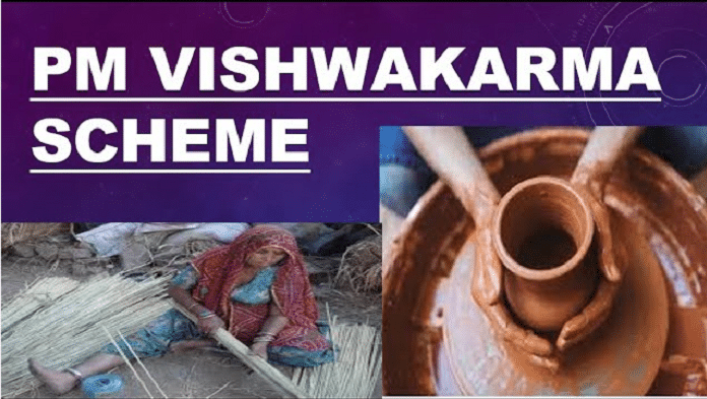
Modi announced the Vishwakarma Yojana would be introduced soon during his Independence Day speech. Following this, the initiative intended to help people trained in traditional craftsmanship was authorized by the Cabinet Committee on Economic Affairs, which is chaired by the Prime Minister.
The government had stated in a statement that the scheme intends to strengthen and nurture the “guru-shishya parampara” (teacher-pupil tradition) or family-based practice of traditional skills by craftsmen and craftspeople using their hands and tools.
A PM Vishwakarma certificate and ID card, as well as credit support up to Rs 1 lakh (first tranche) and Rs 2 lakh (second tranche) at a reduced interest rate of 5%, will be given to artisans and craftspeople as part of the program. Additionally, the program will include marketing assistance, toolbox incentives, skill upgrades, and digital transactions.
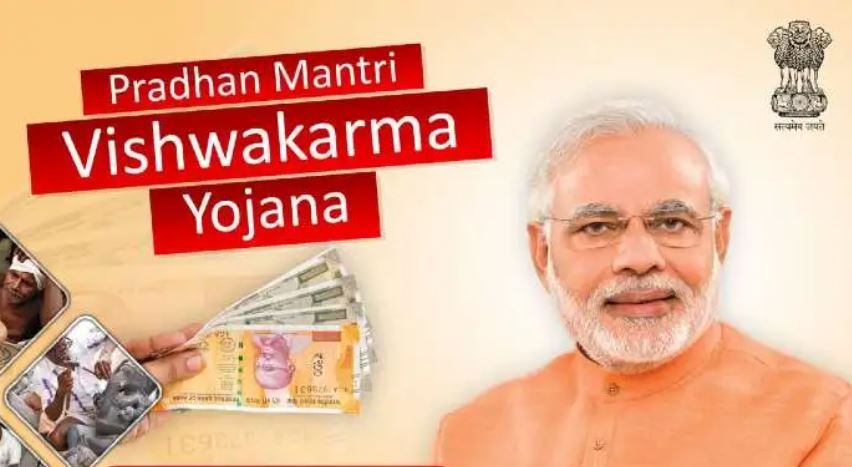
Vishwakarma Kaushal Samman (PM VIKAS) Yojana
Nirmala Sitharaman, the finance minister, launched the PM Vishwakarma Kaushal Samman (PM VIKAS) Yojana for traditional artists and craftspeople in the budget for 2023–2024. “A package of help for them has been conceptualized for the first time. They will be able to integrate their products with the MSME value chain and increase the quality, scope, and reach of their offerings thanks to the new program.
The scheme’s components will also include access to advanced skill training, knowledge of cutting-edge digital procedures, familiarity with effective green technologies, brand marketing, integration with regional and international markets, digital payments, and social security in addition to financial support. The Scheduled Castes, Scheduled Tribes, OBCs, women, and members of the disadvantaged sections will profit enormously from this, she had stated.
Vishwakarma Scheme : Reviving Traditional Crafts
The Vishwakarma Scheme is a significant step towards reviving and rejuvenating traditional crafts that have been handed down through centuries. India boasts a stunning array of traditional crafts, ranging from handwoven textiles and pottery to intricate jewelry and woodwork. These crafts not only reflect the heritage of our country but also contribute significantly to the rural economy.
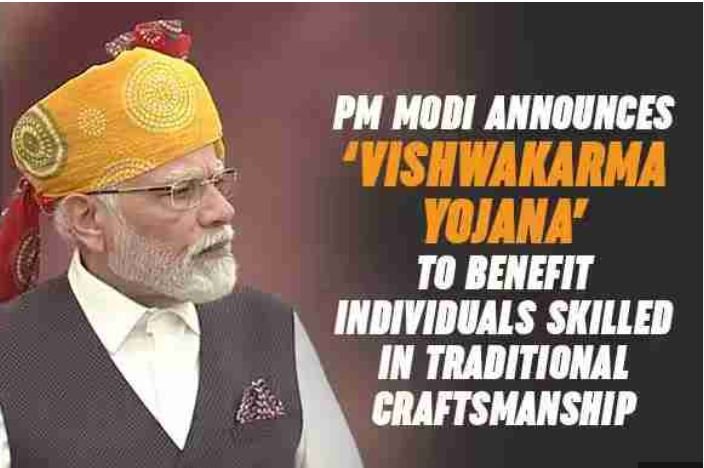
Under this scheme, traditional craftspeople will receive much-needed financial assistance, training, and marketing support. This will enable them to preserve and enhance their skills, as well as market their products more effectively. The goal is to ensure that these artisans can continue to create their beautiful crafts while also improving their socio-economic conditions.
Vishwakarma Scheme : Economic Empowerment and Livelihood Generation
One of the primary objectives of the Vishwakarma Scheme is to provide economic empowerment to traditional craftspeople. By supporting and promoting their crafts, the government aims to create sustainable livelihood opportunities for millions of artisans across India. This initiative will not only help these artisans earn a more dignified living but also prevent the migration of skilled craftsmen to urban areas in search of better opportunities.
Moreover, this scheme aligns perfectly with the “Atmanirbhar Bharat” (self-reliant India) vision. By investing in traditional crafts and promoting local products, the country can reduce its reliance on imports and boost its own economy. This self-sufficiency is a crucial step towards building a robust and resilient nation.
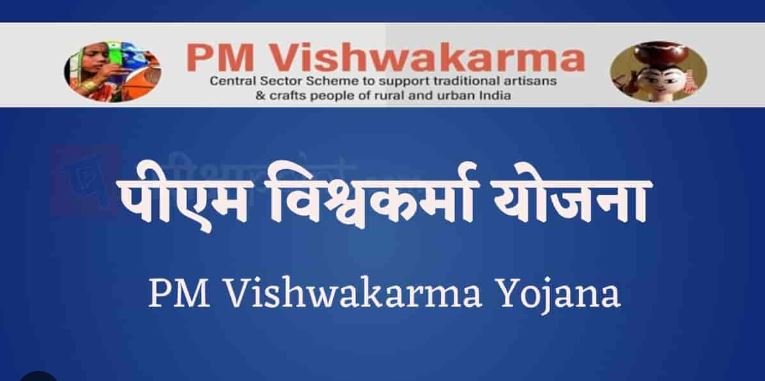
Promoting “Vocal for Local”
Prime Minister Modi’s call to be “Vocal for Local” has gained significant traction across the nation. It emphasizes the importance of supporting local businesses, products, and artisans. The Vishwakarma Scheme complements this initiative by not only supporting local artisans but also encouraging consumers to choose locally made products.
When you buy a handcrafted item, you’re not just purchasing a product; you’re investing in the heritage, skill, and creativity of an artisan. The Vishwakarma Scheme, along with the “Vocal for Local” campaign, urges every Indian to take pride in their local craftsmanship and heritage, thereby contributing to the growth of traditional industries.
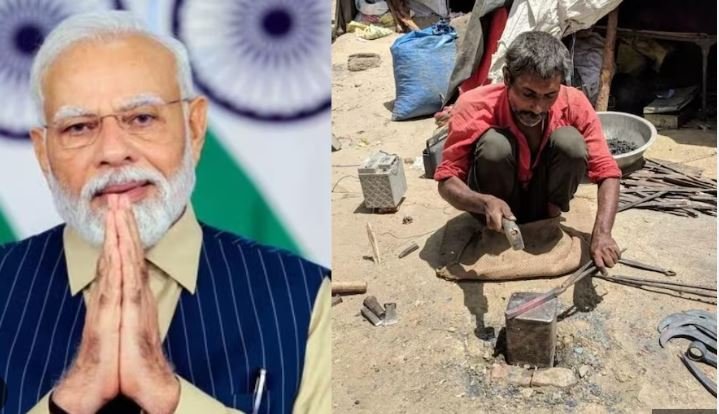
Conclusion
The introduction of the Vishwakarma Scheme by Prime Minister Narendra Modi represents a significant stride towards preserving and promoting India’s traditional crafts and supporting the artisans behind them. By providing financial assistance, training, and marketing support, this initiative not only uplifts the livelihoods of craftsmen but also celebrates the diversity and richness of India’s cultural heritage.
In a world that increasingly values mass production and uniformity, the Vishwakarma Scheme reminds us of the beauty and uniqueness of handmade crafts. It encourages us all to be “Vocal for Local,” supporting the artisans who have dedicated their lives to preserving India’s age-old traditions and crafts. This scheme isn’t just an economic initiative; it’s a cultural celebration of India’s incredible craftsmanship and a testament to the power of collective support for local artisans.
ALSO READ : Vishwakarma Yojana 2023: Exciting Online Application, Save The Start Date, And Secure Your Registration







